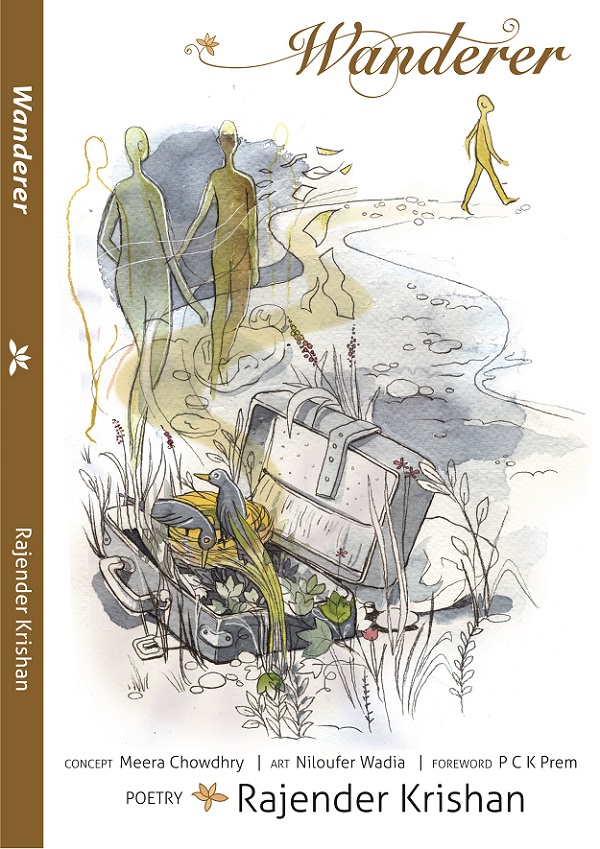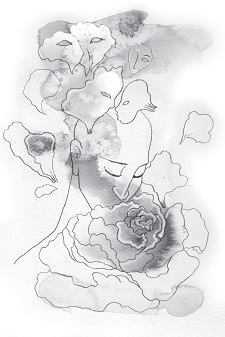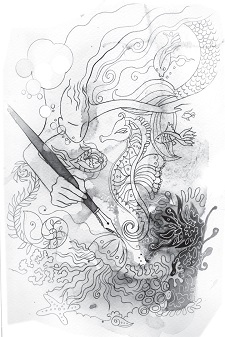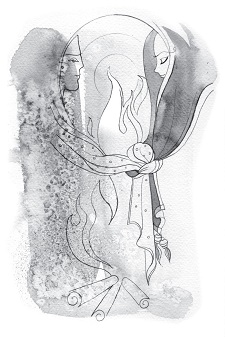Dec 30, 2025
Dec 30, 2025
Indian English Poetry time and again appears in stark contrast with the nuances of regional literature, consistently enlivens lively undertones so as to demonstrate the conspicuous diversity of a nation becoming further explicit through temper tantrums, tenor and drifting designs, eventually epitomizing different regions by igniting a sense of national unity into a single scheme of linguistic framework. The Indian diaspora being more resourceful and insightful seems to beseech for more avid and delightful concentration. This is because the international scene they dwell-in have different linguistic landscapes, distorted, fragmented and dissimilar perception of nationalism asymmetrical in appearance owing to war/pandemic often challenging the love for democratic deliberations, for national integrations. Notwithstanding their deep moral commitment, an ideology for a good and peaceful co-existence come off to keep diverse societies together into a harmonious whole. A new approach to survive, revive the neo-liberal, conservative and progressive thought patterns motivates /enlightens.
Among diasporas as such New York based RK is known in and across the world as a poet of imagination, gumption and perspicuity. Certain implicit western concepts as individuality and autonomy bring him closer to classical poets/thinkers arguing for urgent yet endless revitalization of their creed. He is known for his earlier works “Solitude” and specifically “Amma’s Gospel” which has been translated into many Indian as well as overseas languages only to attracted attention of global community.
Poetry, for RK, unlike contemporary Indian counterparts is neither a protest nor a revolt against existing dehumanization bartering through corruption, immorality, wickedness and debauchery. Contrarily, as a rule, he boarders on a new paradigm that aspires to convey meaningful precepts for day-to-day humdrum routine of a few cultured elites albeit not for all post-colonial cologne smelling Indians. Side by side, like a pragmatist he stays with both feet on the ground and like a conservative escalates upholding traditional values overall in phraseology sublime and succinct.
 The Wanderer {1} like Amma’s Gospel has been published by Setu Publications - Pittsburgh (USA). It’s a collection of nearly 100 homogenous poems well illustrated by Niloufer Wadia of Pune (India) in art silhouettes enhancing its beauty and charm in tandem. A Foreword by PCK. Prem from H. P. (India) graciously graces the contents to further give conspicuous awareness and feel of the text. Previews - 12 in number long and short by eminent academics/bureaucrats also introduce macro readers with poet’s sensibility and proclivity as a whole. The poet in epithets taken from various domains tenaciously dedicates his petty yet pretty meditations to his wife Meera. The book altogether, even if read perfunctorily impresses, elevates and illumines.
The Wanderer {1} like Amma’s Gospel has been published by Setu Publications - Pittsburgh (USA). It’s a collection of nearly 100 homogenous poems well illustrated by Niloufer Wadia of Pune (India) in art silhouettes enhancing its beauty and charm in tandem. A Foreword by PCK. Prem from H. P. (India) graciously graces the contents to further give conspicuous awareness and feel of the text. Previews - 12 in number long and short by eminent academics/bureaucrats also introduce macro readers with poet’s sensibility and proclivity as a whole. The poet in epithets taken from various domains tenaciously dedicates his petty yet pretty meditations to his wife Meera. The book altogether, even if read perfunctorily impresses, elevates and illumines.
A reviewer {2} from Chennai recalls W. W’S most memorable line - ‘I wandered lonely as a cloud’ from “Daffodils” and elaborately justifies summarily by stating that RK’S Wanderer is the discovery of a destination in a right spirit to feel the bliss of solitude. It is really so - ‘The elements five/Performed a Yoga/And built the temple divine’ “Elementary” (103). The poet in W. W. finds solace in nature and its variegated phenomenon are objects of his meditations while RK’S wanderer introspects to discover the true meaning of mundane existence. The quest to know and give vent to eternal form of ultimate reality both pleases and teases, mystify and mesmerize when the poet eloquently communicates - ‘That what is inexpressible/is best to remain nestled/as the eternal witness’ “Inexpressible”(29). Thus, RK’S wanderer is not a race of nomads who for livelihood drift from one place to another to find new pastures for silage. His is a complacent being wandering in search of genuine feelings of head and heart. It’s as true as truth itself. The learned critic rightly speculates - ‘The poet, at times, expresses a thought tersely as if an adage or a proverb. If one concentrates, it conveys multiple meanings.’ “Foreword”(11). Accordingly, the image of India, as in a pot of holy water rising up magnetically as if purified by the touch of myriad races and religions. Likewise, two scholars are seen debating on issues like ego, morality, self-worth and other such nitty-gritty of life ending in uncertainty to prove inconclusive. A rapt observer overhears to walk away contentedly. Contentment is the cradle of joyfulness; it is the essence of delight the poet sums up pertinently in last lines - ‘akin to the wandering mystic /with the discovery of an aphorism. ’ “Debate”(61). Contentment begets discovery and discovery ecstasy - ‘Accepted all as they were/and moved on, blissfully/Sharing the essence of love’ “Contentment ”(83).
What is next, the illumined poet attributes all happenings of life to Divine Order called RTA in the Vedas. It is the eternal law, and all are subjected to it, nothing is beyond. However, what contradicts and causes conflict - is the mind. Mind the poet asserts - ‘Pull and push of strange influences/leading to a conflict of nerves/causing hasty or indolent reactions?’ “Mind”(39). It - the mind, rejects and betrays the cosmic reality symbolized by RTA and wants the universe to behave in its(mind’s) own way. Being part of grand cosmic network, it creates a dream world of fantasy wherein pleasant actions are accepted and unpleasant discarded. The poet seems to have invariably drawn the imagery from John Milton’s “Paradise Lost” in depicting the mind and its vagaries because for Milton - “Mind has its own place and can make a hell of heaven and heaven of hell. ”{3}
The Wanderer of poet’s imagination is not a rolling stone, an aimless vagabond or a hobo of nomadic origin, he rather has his own roots strongly glued to a land of vibrating traditions, cultural assimilation and age-old civilization of exalted moral values reflecting unflinching faith and dedication to a cause: Divine. Nowhere the Wanderer is a challenge to defy/ disregard the existing norms of society, he, rather as an alternative, manifests into a persona/character to edify one and all by deeper sense/ understanding of scriptural import, by rising above the babel of indigenous languages.
No doubt the impending war and world-wide massacre by the twin emic called Covid-19 is still a constant threat to contemporary times, yet the poet’s spirit is not the least diminished. He knows the reality that is behind and beyond the manifestation - the world of creation : ‘The new journey/must begin, unsullied/without any luggage/to explore the unknown’. “Wanderer”(91).
 While marching forward the poet feels the fragrance of transitory existence emanating from snipped flowers. He is impelled by the inward sense of realization to discover difference between the self and the non - self, so - ‘Pensively enters in the/ashes of burnt memories’. “Fragrance”(85). The Bhagavad Gita(8/6) {4}states that what does not exist, is now no more, it has vanished into oblivion, it only teases, but most often pleases the memory and ultimately provides meaning to life lived satisfactorily or crossly. If the doer does in resilience and right fortitude, then only he acquaints himself with subtle laws of destiny - ‘The Karmic principle/is indeed candid and blunt/Whichever way one deals/it rebounds with equal brunt’ “Karma”(109). The Karma philosophy illustrates succinctly Indian concept of Universal Causal Law by which good or bad actions determine the future mode of an individual’s existence. In its essence, Karma refers to both the actions and the consequences of the actions - ‘Fair and square transactions/garner goodwill and gain/Illicit and corrupt practices/trigger malice and pain. ’ “Karma”(109). Karma is the life principle that determines the fate/the future by seeking diagnosis of individual ailments and malaise attributable to cosmic disorder or bedlam.
While marching forward the poet feels the fragrance of transitory existence emanating from snipped flowers. He is impelled by the inward sense of realization to discover difference between the self and the non - self, so - ‘Pensively enters in the/ashes of burnt memories’. “Fragrance”(85). The Bhagavad Gita(8/6) {4}states that what does not exist, is now no more, it has vanished into oblivion, it only teases, but most often pleases the memory and ultimately provides meaning to life lived satisfactorily or crossly. If the doer does in resilience and right fortitude, then only he acquaints himself with subtle laws of destiny - ‘The Karmic principle/is indeed candid and blunt/Whichever way one deals/it rebounds with equal brunt’ “Karma”(109). The Karma philosophy illustrates succinctly Indian concept of Universal Causal Law by which good or bad actions determine the future mode of an individual’s existence. In its essence, Karma refers to both the actions and the consequences of the actions - ‘Fair and square transactions/garner goodwill and gain/Illicit and corrupt practices/trigger malice and pain. ’ “Karma”(109). Karma is the life principle that determines the fate/the future by seeking diagnosis of individual ailments and malaise attributable to cosmic disorder or bedlam.
RK thus appears creating in most of his poems enough of common sense/consistency by putting forward systematic images to do away with anarchy and multiple dualities of thought patters. What unfolds the bag of mysteries to lay bare the veiled truths, to transcend mundane tomfooleries, to embrace infinite beauties of the universe and to evolve a precinct vision is indeed poet’s long cherished agathism.
 The creative moment has its own difficulties and complexities, it is a restless phase exerting immense efforts to reach to perfection: a state of impeccable unity amidst amazing diversity of the cosmos. Like omnipresent creator the whole creation of the poet is his auspicious manifestations par excellence - ‘depicting all kind of moods, grasping/which begins the genesis of /fresh desires of novel ingenuity’ “Creativity ”(47). The poet seems more or less austere /democratic in depicting all kind of moods, traditions, faith, perspicuity besides upholding the creative flame. Sometimes dreams aspire for a dive into immeasurable depth of the unknown, at others experiences an unusual feat, an uncommon spectacle then gradually moves –‘from one form to another/changing from grosser/to subtler to sublime layers’ “Creativity”(47). This poem in brief portrays aesthetically almost all relevant features an ingenuous poet requires in order to compose/to disseminate his poetic premises.
The creative moment has its own difficulties and complexities, it is a restless phase exerting immense efforts to reach to perfection: a state of impeccable unity amidst amazing diversity of the cosmos. Like omnipresent creator the whole creation of the poet is his auspicious manifestations par excellence - ‘depicting all kind of moods, grasping/which begins the genesis of /fresh desires of novel ingenuity’ “Creativity ”(47). The poet seems more or less austere /democratic in depicting all kind of moods, traditions, faith, perspicuity besides upholding the creative flame. Sometimes dreams aspire for a dive into immeasurable depth of the unknown, at others experiences an unusual feat, an uncommon spectacle then gradually moves –‘from one form to another/changing from grosser/to subtler to sublime layers’ “Creativity”(47). This poem in brief portrays aesthetically almost all relevant features an ingenuous poet requires in order to compose/to disseminate his poetic premises.
What’s more, when the whole world is undergoing apocalyptic furor due to Covid-19 the poet finds an apt environment for his solipsism - the genesis of the Wanderer, how cogently he asserts - ‘the wandering begins to search a purpose, to understand the cause and to ascertain the destination’ “Preface ”(27). The poet thus is very clear in his motif and mission. Perhaps, inspired by the precept of the Gita –‘Samsayatma vinasyati’ (4/40. ) these poetic pieces/lyrics not only give meaning, purpose and charm but also instruct discerning readers for rising above the mundane, enjoy the bliss of meditation to hone the character and personality - ‘No wonder, the mystic meditates/tranquil with dropped eyelids/oblivious to the transient spectacle’ “View”(31).
The quest continue and the creative dilemma persist in between powers wasted in getting and spending, forgetting/recollecting. No doubt, human life is a windfall that teaches to live in perfect harmony, in company next of kin by shirking differences to make creative process a mutual act of respite and respiration - ‘You write, I recite/You compose, I describe/You decide, I abide’ “Cordial”(35). Parental bond is an unending debt difficult to recompense. It is an unexplained reality/truth the poet endeavors to explain - ‘the parent, who has/long been gone/and yet is a part/of one’s very own being?’ “Remembrance”(33). The sense of right or wrong, good or bad, hate or love, in succession is determined by the power of cultural behavior, by the gravity of discrimination: Viveka - ‘reasoning why and what to do/but stays reserved on how to act.’ “Conscience”(41). The fact that belies everyday reality is that we need not to reject or disallow the body, society or the world as a whole, instead transcend in sum relative manifestations so as to merge into the infinite ocean of Sat-Cit-Ananda: The one non-dual reality.
What matters most is the genetic material or off the point dynamics or the combination of both that play biggest role in devising our penchant for delectable and marching forward in life and career. As a whole, our preferences are spurred by many complex invisibles those fall into the territory of non - genetic hegemony. In such a case Samskaras of our past lives play a decisive role in present state of affairs - ‘The selection one makes/result in the life one lives/It is never too late/to make a cleaner choice. ’ “Choices”(141). Often Samskaras upstage the genetic powerhouse - ‘The glistening dew/moistens warmly/the ecstatic eyes of /an aging grandpa/on a morning stroll’ “Naissance” (201). Subjectivity seems to come to the fore where we see a child prodigy bypassing the normal learning process - ‘Life taught me, incredibly young/through accidents and design/how to walk, in sync with her’ “Schooling”(95). Such children are wildcard entries in charting a course of excellence with a Karmic connection to fly higher, faster and stronger. Sometimes their uncanny feats springing from right Samskaras lead them to attain glory - ‘Emotional ocean/ ecstatic fusion/ moistened eyes/ love unsurpassed. ’ “Appreciation”(187).
R. N. Tagore’s poetic works are perfect synergy of genes and Samskaras powering phenomenal levels of creativity in qualitative and quantitative terms. This is due to Samskaras the poet imbibed from his sage like father D. N. Tagore and carried them forward to shape the destiny of independent India. Besides genes and samskaras, the third dimension is of physical environment - the milieu. It comprises human boundaries, socio - political, economic or other such pressures which emerge formidably either as positive or negative synergy. T. S. Eliot too views milieu as a force either detracting /opposing human progress or an ally to genes and samskaras urging to swim against the tides to reach to glorious shores. How pertinently the poet seeks a perfect balance between two antagonistic forces –‘Maintaining diverse fashion/Life mystifies with passion/Scales of equilibrium necessitate/The see-saw and swing oscillate’ “Balance” (213).
The overall intertextuality reveals unequivocally that the poet is deeply influenced by his revered Grandma whose indelible imprint on his upbringing, ideology, mysticism and inquisitive quest aspiring for a new dawn is superbly unquestionable. What highly distresses the poet is not only contemporary bleakness and despondency but also the unexpected outburst of flu or plague like fear of pandemic. Pandemic has many interior tales of weal and woe to tell. It’s severity and gravity, it’s trauma and despair, its fiascoes brought about unimaginable misfortunes and catastrophes. This collection of immortal poems contains many hidden truthful answers for the mortality and ephemeral reality of pandemic epoch - ‘The deadly wave of Corona/seems to be aggressively distorting/social ethos and the world view/times are really getting tough. ’ “Venal ”(227). Even today this statement withstands the test of times amidst variegated variants certifying the bedlam and commotion prevalent in contemporary elusiveness of the world. In the face of such hazards looming unopposed the poet dares to invent some noble truths acting as moral capsules for leading an upright and exemplary life.
 When times revel in the progressivism of promiscuities it is difficult to follow the conjugal ethics put forward for modern guys - ‘Wedding…/a life - long commitment/a practice of caring and sharing/…. weathering the seasons in unison/resolving the rifts/…until the final curtain is drawn. ’ “Marriage”(173). Actually, married life can be wonderful and blissful provided the couple discards altogether all differences through meaningful discourse.
When times revel in the progressivism of promiscuities it is difficult to follow the conjugal ethics put forward for modern guys - ‘Wedding…/a life - long commitment/a practice of caring and sharing/…. weathering the seasons in unison/resolving the rifts/…until the final curtain is drawn. ’ “Marriage”(173). Actually, married life can be wonderful and blissful provided the couple discards altogether all differences through meaningful discourse.
What makes the poet Indian rather Pan-Indian is the meticulous awareness of India’s manifold manifestations of creed, custom, heritage, cuisine, festive celebration, attire and language. This vast diversity of cultural distinction, as mentioned earlier, as the regional differences in which India abounds, is indeed an affirmation of our unique Geo-culturalism. {*} India’s cultural differences are not disintegrating forces rather together form a symbiotic or mutually beneficial relationship as separate pieces of a jigsaw puzzle fit together to form a composite picture.
Another aspect of RK’S poetry that attracts immediate attention is that like most of his Indian/American or English counterparts he seems more or less a hierophant. It is because initially as a thinker, an observer, an interpreter, a philosopher and above all as a poet his ideas, ideals, views and attitudes have an eternal and timeless dimension like that of great renaissance classics. One who reads him scrupulously finds an inadvertent impact of both Indian as well as alien classical writers on his nascent mind. This is the reason his poetry contains/creates an environment where the echoes of peaceful sylvan woods are sensuously heard over the gap of time. It is amazing to see the mystifying forces, the illusions and distractions those mislead, delude and often hoodwink but the beauty, allure and aura of the mortal world sensibly steer him to ordained destination. The mundane actions and impulses impel one to a kind of sense/ sensibility that ultimately beget immense possibilities of accomplishment - ‘Endearingly loveable/Ideally compatible/Despite odd prongs/ They versify songs’ “Poetry”(207).
Ego is another integer that integrates the outer and the inner world of a person’s image/character. It is very difficult to overcome it by putting it in balance because it poses a lot of difficulties, obstacles and barriers in the path of spiritual progress/fruition and evolution of the Self. Its mystery is so subtle that nobody can get rid of its enticing force. So much so that even after persistent efforts one cannot reject its irresistible charm. However, man can liberate him from ego’s clutches by enlarging the consciousness and its infinite dimensions - ‘Content and caring/remains virtuous/aware of being eyed/by the watchful Self’ “Veracity”(79). Moreover, the poet in RK being sensitive enough meticulously observes the events, incidents, the emotions and variegated moods shifting from one object to another looking exactly alike in honing truthful thoughts and common beliefs such as - ‘Feeling lonely amidst a crowd/listening sounds in solitude/Being abruptly halted/to experience, out of the blue’. “Encounters”(233).
The Wanderer as a whole is a transcendent attempt to liberate man from the chaotic spectacles of life and times. At each stride the ephemeral, the transient, the commonplace and the monotonous appears to be substituted by the eternal, the unending, the exotic and the bright. All poems virtually assemble together to form a congregation of scholars, savants, mystics, philosophers and philanthropists to discuss cordially higher truths, the precarious laws of Karma, the mysteries of meditation and the righteousness of Dharma for ultimate salvation/liberation from the clutches of ignorance/illusion. Convincingly the poet seems to sing the songs, sometimes humming blissfully the joys and ecstasies of his emancipated being - ‘The wandering mystic/continue to bask /in the pristine glory/of his unique Self. ’ “Matchless”(73). At other times the poet looks conforming to concepts of devotion, capitulation and surrender - Bhakti/Prapatti - ‘Whatever comes is/entitlement of labor/bestowed by His grace’ “Virtue”(139). The concept of Nirvana or nihilism is symbolized by - ‘Meditative Mystic/wants to remember/by unlearning/what was learnt’. “Cipher”(69).
To sum up, RK’S beautifully chiseled short /long pieces of lyrics attempt to portray an invisible artist within - an ageless, timeless and ever-expanding changeless universe pitched against the moral, the ethical and the spiritual human values competently designed by visual aids to devise surreptitious destiny/propensity of generations essentially for the pastime of posterity and the whole lot of human bequests.
How aptly it relates to extract - ‘A Wanderer/In a wonderland /With many wonders/Some Quixotic/Others Alice like/… The echoing sound/Of a golden dear - - /Ha Rama ! Ha Rama !/A wanderer/In a wonderland /Magically masked/At the enchanted pool. ’ “ I Am A Sea”{5}`. RK’S Wanderer thus corroborates universal commonality of ethical concerns by transcending astonishingly traditional trio of regions, nations and geographies to anticipate a new paradigm shift.
Works Cited with Notes
{1} Krishan Rajender - Wanderer : Setu Publications Pittsburgh (USA ). All subsequent references are to this edition.
{2} Ibid(273)
{3} Milton John - The Paradise Lost : Rep., New Delhi - UBS Publishers/Distributers Ltd., Print - 2000.
{4} The Bhagavad Gita : Gorakhpur :Gita Press - India, Print - 2012.
{*} Geo - Culturalism – Simply means significant geographical locations that takes into consideration cultural characteristics of inhabitants such as common language, history of the location, art and sculpture showing native talent, ability and knack.
{5} Pande, Suresh Chandra - I Am a Sea : Aligarh - Skylark Publications, Print - 1995. (13).
04-Jun-2022
More by : Dr. Suresh Chandra Pande

|
He is inimitable as always....so meaningful |